Fowl adenovirus serotype 4 (FAdV-4) is recognized as an economically important pathogen for the poultry industry worldwide. FAdV-4 infection causes a metabolic disturbance of hepatocytes, leading to hydropericardium-hepatitis syndrome (HHS) in poultry. However, the metabolic response of hepatocytes to FAdV-4 infection remains poorly investigated. Here, a tandem mass tag (TMT)-based approach was first used to quantitatively identify differentially expressed proteins (DEPs) in leghorn male hepatoma (LMH) cells infected with the virulent FAdV-4 strain GY. We identified 666 DEPs associated with many biological processes and pathways, according to Gene Ontology and Kyoto Encyclopedia of Genes and Genomes pathway analyses. Functional enrichment analysis revealed that three pathways, including metabolism-related signaling pathways, apoptosis, and autophagy responses, were enriched during FAdV-4 infection. Moreover, excessive induction of metabolism-related signaling pathways by FAdV-4 infection might be associated with HHS induced by the virus. Meanwhile, among the proteins in these pathways, RRM2, SAE1, AEN, and RAD50 were verified through western blotting to be markedly altered in FAdV-4-infected LMH cells. Notably, overexpression of SAE1 inhibited the replication of FAdV-4 in vitro, whereas silencing of SAE1 expression promoted the replication of the virus. Collectively, our findings show for the first time that SAE1 is a host cellular protein that plays roles in regulating the life cycle of FAdV-4.Copyright © 2021 Elsevier B.V. All rights reserved.
A tandem mass tag-based quantitative proteomic analysis of fowl adenovirus serotype 4-infected LMH cells.


